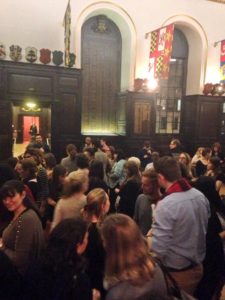
The Society of Young Publishers AGM 2015: Diversity in Publishing
Posted on January 17, 2015 in Uncategorized
Diversity and equality are big buzzwords in publishing at the moment but it can often be hard to see what is actually being done beyond what Crystal Mahey-Morgan terms ‘goodwill and rhetoric’. When the SYP met for our AGM last week with this as our debate topic we knew we could only scratch the surface but we wanted to start a conversation; one that has spread across twitter and blogs in the day’s following the event.
We assembled a panel consisting of:
Kyle Cathie – MD and founder of Kyle Books
Abigail Barclay – Managing Consultant at Inspired Selection
Seonaid McLeod – Publisher Relations Executive at the PA and speaking on behalf of Equip
Suzanne Collier – owner and founder of BookCareers
and each speaker had a slightly different perspective on diversity in publishing coming from, a recruiter’s point of view; an agency who works with publishers to place candidates; an industry body or a long time member of the industry who is researching career trends and working with jobseekers respectively.
The first thing that the panel touched upon was there are many different types of diversity and that the word can be difficult to define. In the course of our discussion we looked at various types of disadvantage, from a woman who is discriminated against for taking leave for maternity appointments, to a man hoping to work in children’s publishing, to BAME graduates trying to get into the industry.
We felt that a level of sensitivity and awareness is needed to deal with all of these challenges on behalf of employers – not to mention an awareness of the Equalities Act – however with BookCareers research indicating ‘93.7% of all respondents [working in publishing] classed themselves as White’ and in the 2011 census 44% of Londoners identifying themselves as White British, it is clear that publishing is failing on racial diversity.
Work experience and unpaid internships are often mentioned as barriers to social equality in publishing and our panel all agreed that candidates should not be expected to undertake more than two weeks unpaid work experience. They also concluded that it needed to be made easier for publishers to take on people under 18 so that they could gain a flavour of the industry. By the time people graduate university they often have a good idea of what they want to do or may be in a difficult financial situation that limits their options. Opening up work experience and taster days to school pupils will widen the type of people that we have coming into publishing.
The issue of salaries being too low, particularly in comparison with industries such as finance and even advertising that recruit graduates of a similar calibre was cited as a major obstacle to non-traditional people working in publishing. Entry-level salaries have stayed well below the UK average over the last five years, and in trade publishing especially can make it very difficult to survive in London on the wage offered. Career progression is also often uncertain which makes publishing a less attractive career option for those without the financial backing of their parents.
A question from a member of the audience made us all think about how a lack of diversity in the books we produce may be affecting the range of people who want to work in publishing. The audience member noted that a BAME mother had published her own children’s’ books because of a lack of titles on the market that her children could see themselves reflected in. The panel felt that one type of diversity inevitably fed into the other, which led us to the business case for increased access. In order for publishing to compete with other content industries we need to be producing books that appeal to the widest section of society in whatever format. To do this we need people working for us that understand these demographics and know how to reach them. Publishing needs to be more outward facing and more responsive in building an audience.
There are many ways in which process is being made, not least in the Equalities Charter that is run by Equip and the PA; the long term paid internships for BAME candidates offered by PenguinRandomHouse; the Insight into Publishing days hosted by Hachette and the Creative Access scheme. It is up to all of us to become more aware of this situation and to make a concerted effort to change it, for the protection of our own future as well as because it is right.
For future SYP events have a look at our website.
More blogs on the AGM are listed below:
http://www.bookcareers.com/publishing-needs-to-take-a-good-hard-long-look-at-itself/
http://atwoodtateblog.co.uk/syp-agm-2015/
https://www.inspiredselection.com/blog/syp-agm-2015-chairs-handover-speech






 Listen to the podcast
Listen to the podcast  Explore the Youtube channel
Explore the Youtube channel